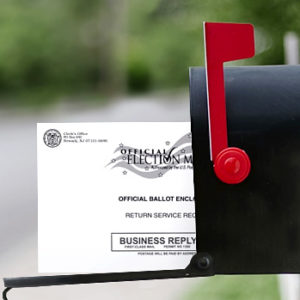The First Amendment lawyer famous for Citizens United has taken up arms against a new foe: all-mail voting.
Jim Bopp, Jr. filed two lawsuits in federal court this week — one in Nevada and one in Virginia — to stop officials in those states from mailing out ballots to everyone on the voter rolls, not just those who request them.
“I don’t use the word ‘voters,’” he says, “I use the word ‘people on the registration rolls’ because many of them are ineligible to vote. They’re not voters. They’re people that are on the registration rolls that are ineligible to vote.”
As the COVID-19 pandemic gripped the nation, Democratic officials and activists began pushing states to switch to voting by mail, eliminating in-person voting altogether — and probably permanently.
But organizations that have spent years reviewing the voter rolls in many states estimate that more than 20 million of the names nationwide are duplicates, people who have moved away, are deceased, non-citizens or felons who have not had their voting rights restored.
“Democrats have been trying to register everybody in the country and then fight purging the rolls of ineligible people, and now they want to mail ballots to every single one of them,” says Bopp. “It’s just like, talk about the most massive fraud scheme in the history of America. Makes Tammany Hall looks like a bunch of pikers, or the Pendergast Machine in Kansas City look like they didn’t even know how to steal elections.”
Earlier this month, Bopp filed a brief in New Mexico on behalf of the organization True the Vote and individual voters, whose votes could have been canceled out by the votes of ineligible voters if the court sided with plaintiffs — county clerks who wanted ballots mailed to everyone, not just those who’d requested them.
“What the parties request this court to do here is little else than pure anarchy that robs both the legislature and the eligible, registered voters of New Mexico of the authority and protections afforded each under the New Mexico [Constitution] and the United States Constitution,” the brief reads.
Bopp argued that the rights of voters were “imperiled” by the plaintiffs’ request and that the plaintiffs have attempted to “entice” the court to “utilize the national emergency created by the COVID-19 virus as a guise to usurp the constitutionally delegated authority of the legislature and overrule and replace current election laws with robust protections against voter fraud with a court-created scheme of mail-in balloting.”
The Supreme Court of New Mexico sided with Bopp and denied the request for ballots to be sent to all names on the rolls.
But now the push is on for all-mail voting in the November presidential election, as well. About a half dozen state have already legalized it.
“They are bringing suits all over the country to impose it through court orders,” says Bopp. “All-mail. Their ideal is all-mail.”
All-mail voting is not the same as absentee voting as voting absentee involves the voter requesting an absentee ballot, usually by mail, with a signature.
Some states have more stringent requirements than others. In Kansas, for example, people requesting an absentee ballot are required to send a copy of a driver’s license or State ID with the application for an absentee ballot.
“Part of the problem with this discussion is, we are familiar with absentee ballots, and that does involve quote mailing a ballot, end of quote,” says Bopp, “but there are numerous safeguards, the most important of which is the prior application. You have to apply.
“You have an audit trail, and all sorts of things. And that’s why a lot of these Democrats and liberal activists don’t like absentee ballot,” he says. “They want wholesale mailing out without application because it eliminates half the fraud protection.”

